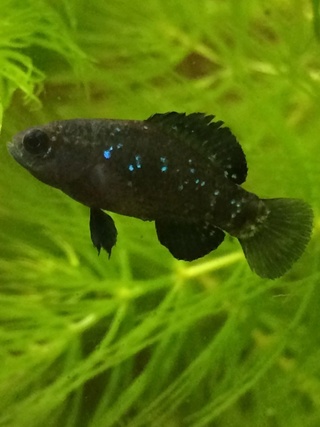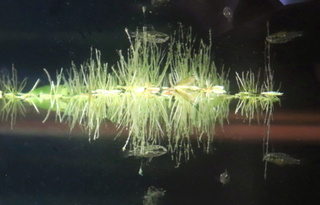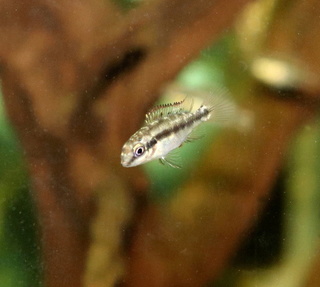Using disinfectant wipes and aquariums
2 posters
Page 1 of 1
 Using disinfectant wipes and aquariums
Using disinfectant wipes and aquariums
Using disinfectant wipes and aquariums
I though this would extremely pertinent to many hobbyists, new and experienced, and the legendary (we have a few here on the forum).
Some of the best disinfectants have been used by aquarists for a long time, as a tried and true remedy for tank cleaning, equipment and disease control. These include weak salt solutions, hydrogen peroxide, ozone and diluted bleach. Needless to say, care must be taken even when using these known disinfectants around fish. Chlorinated water in itself is weak cleanser, as it is bacteriostatic (reduced ability for bacteria to grow) but is not bacteria-cidal (as in kills). Concentration of these agents (how strong or weak, full strength or dilution) needs to be well researched and understand when using agents like these, so knowledge is key.
The key to disinfecting is the agent PLUS the contact time. Simply applying and then wiping may not be effective enough, as the time of contact with bacteria, fungus, algae is more important in getting effective control. We have seen many members here post on using O3 (ozone) as a blasting agent for nuisance algae.
What about Chlorox Wipes, disinfectant wipes for wiping down bags and equipment?
Right now, the focus has been using disinfectant wipes in the world of COVID19. If you can get them, they are extremely effective and have been a front line piece of armor in protecting ourselves and others.
If you read the label, the claims will read somewhat like this:
• Kills 99.9% of germs that can live on surfaces for up to 48 hours
• Kills 99.9% of Viruses* and Bacteria,
• Kills Staph, E. coli, Salmonella, Strep.
Looking at the ingredients, you will be able to find:
Fancy chemical names, but the ingredients which makes these wipes so effective for both contact kill and RESIDUAL kill effects are what are known as "quats". Commonly in many formulations you will notice "dimethyl" and "ammonium" and this should assist non-chemists in identifying "quats". Notice the addition of alcohols (chemicals ending in -anol) which are effecting contact killing agents.
With all these ingredients, these disinfectant wipes are highly effective (99%) against a wide range of micro-organisms. One types of ingredient is effective against a certain range of microbes, whilst others on a different range. When you add them together, you get an overlap of range which is broad spectrum and suits virtually all situations.
CAUTION:
Never use wipes with these ingredients to clean inside of aquariums, or where there may be a chance that wiped surfaces may come into contact with fish or shrimp. The reason is the RESIDUE of the quats, which are formulated to last hours once wiped onto surfaces to continually disinfect.
What about rubbing alcohol?
Rubbing alcohol, the disinfectant ingredient used in hand cleaner (gels). This chemical is written on the label as "isopropyl alcohol". For COVID19, the concentration (strength) has to be above 65% - 70% in order to have disinfectant action. The lesser concentrations (50%) are not effective. 99% is overkill, and you may with to dilute down to 70% as the addition of water is necessary to prolong the contact time since 99% evaporates too fast to have durable effect. The gels are manufactured with common glycerin in order to retain the alcohol and make the product easier to spread. Addition of fragrances and aloe promote the "sense of clean".
Using isopropyl or isopropanol as a spray (ie no gel) is highly effective as a cleanser and does not leave a toxic residue for fish. The gel however, creates a potential residue, and it is hard to say is the unregulated excipients found in gels are harmful or safe for aquarium life.
Well, here's to washing your hands with soap and water for at least twenty seconds. Remember that you can't just wet your hands, you have to take rub your thumbs, finger nails and tips, in between your fingers as well as your palms and back of hands, in warm water, with soap. (public service announcement).
So,
I though this would extremely pertinent to many hobbyists, new and experienced, and the legendary (we have a few here on the forum).
Some of the best disinfectants have been used by aquarists for a long time, as a tried and true remedy for tank cleaning, equipment and disease control. These include weak salt solutions, hydrogen peroxide, ozone and diluted bleach. Needless to say, care must be taken even when using these known disinfectants around fish. Chlorinated water in itself is weak cleanser, as it is bacteriostatic (reduced ability for bacteria to grow) but is not bacteria-cidal (as in kills). Concentration of these agents (how strong or weak, full strength or dilution) needs to be well researched and understand when using agents like these, so knowledge is key.
The key to disinfecting is the agent PLUS the contact time. Simply applying and then wiping may not be effective enough, as the time of contact with bacteria, fungus, algae is more important in getting effective control. We have seen many members here post on using O3 (ozone) as a blasting agent for nuisance algae.
What about Chlorox Wipes, disinfectant wipes for wiping down bags and equipment?
Right now, the focus has been using disinfectant wipes in the world of COVID19. If you can get them, they are extremely effective and have been a front line piece of armor in protecting ourselves and others.
If you read the label, the claims will read somewhat like this:
• Kills 99.9% of germs that can live on surfaces for up to 48 hours
• Kills 99.9% of Viruses* and Bacteria,
• Kills Staph, E. coli, Salmonella, Strep.
Looking at the ingredients, you will be able to find:
- Water (Agua)
Hexoxyethanol (Hexoxietanol)DL
Isopropanol (Isopropanol)DL
C12-14 Alcohols Ethoxylated Propoxylated (Alcoholes Etoxilados Propoxilados C12-14)DL
Alkyl C12-14 Dimethylethylbenzyl Ammonium Chloride (Cloruro de Amonio Dimethylethylbenzyl Alquilo C12-14)
Alkyl C12-18 Dimethylbenzyl Ammonium Chloride (Cloruro de Amonio Dimethylbenzyl Alquilo C12-18)
Sodium Bicarbonate (Bicarbonato de Sodio)
Citric Acid (Ácido Cítrico)
Fragrance (Fragancia)
Fragrance Ingredient (Ingrediente de fragancia)
d-Limonene (d-limoneno)DL
Myrcene (Mirceno)
Fancy chemical names, but the ingredients which makes these wipes so effective for both contact kill and RESIDUAL kill effects are what are known as "quats". Commonly in many formulations you will notice "dimethyl" and "ammonium" and this should assist non-chemists in identifying "quats". Notice the addition of alcohols (chemicals ending in -anol) which are effecting contact killing agents.
With all these ingredients, these disinfectant wipes are highly effective (99%) against a wide range of micro-organisms. One types of ingredient is effective against a certain range of microbes, whilst others on a different range. When you add them together, you get an overlap of range which is broad spectrum and suits virtually all situations.
CAUTION:
Never use wipes with these ingredients to clean inside of aquariums, or where there may be a chance that wiped surfaces may come into contact with fish or shrimp. The reason is the RESIDUE of the quats, which are formulated to last hours once wiped onto surfaces to continually disinfect.
What about rubbing alcohol?
Rubbing alcohol, the disinfectant ingredient used in hand cleaner (gels). This chemical is written on the label as "isopropyl alcohol". For COVID19, the concentration (strength) has to be above 65% - 70% in order to have disinfectant action. The lesser concentrations (50%) are not effective. 99% is overkill, and you may with to dilute down to 70% as the addition of water is necessary to prolong the contact time since 99% evaporates too fast to have durable effect. The gels are manufactured with common glycerin in order to retain the alcohol and make the product easier to spread. Addition of fragrances and aloe promote the "sense of clean".
Using isopropyl or isopropanol as a spray (ie no gel) is highly effective as a cleanser and does not leave a toxic residue for fish. The gel however, creates a potential residue, and it is hard to say is the unregulated excipients found in gels are harmful or safe for aquarium life.
Well, here's to washing your hands with soap and water for at least twenty seconds. Remember that you can't just wet your hands, you have to take rub your thumbs, finger nails and tips, in between your fingers as well as your palms and back of hands, in warm water, with soap. (public service announcement).
So,
Keep cleaners away from aquarium life, as they are by nature, killing agents.
Bleach dilution, as described above is an effective cleaner that does not leave a residue, and a weak dilution of up to 5% is great for cleaning aquariums and equipment.
Rubbing alcohol spray is effective in killing many bacteria (and viruses) and some spores and is effective for disinfecting aquariums and equipment.

alexmtl- Veteran Member

- Posts : 3274
Join date : 2013-09-07
Location : Montreal Quebec
 Re: Using disinfectant wipes and aquariums
Re: Using disinfectant wipes and aquariums
This is really useful, and much appreciated info.

GaryE- Veteran Member

- Posts : 2505
Join date : 2013-09-07
 Re: Using disinfectant wipes and aquariums
Re: Using disinfectant wipes and aquariums
Thanks Jedi Master @GaryE

alexmtl- Veteran Member

- Posts : 3274
Join date : 2013-09-07
Location : Montreal Quebec
 Re: Using disinfectant wipes and aquariums
Re: Using disinfectant wipes and aquariums
Quats (quaternary ammonium compounds) are potent disinfectants found in disinfectant wipes, sprays and other household cleaners, advertised to kill germs, "antibacterial" or "sanitize". You can google this term to read more, as there are many internet articles written about these chemical, that are seemingly safe. They are certified by the EPA as pesticides, and you can find more about what the CDC and other health advisory organizations are saying about the advantages and disadvantages of the chemicals.
For certain, the best use is in the hospital for sanitization and sterilization of equipment between procedures and patients. Depending on the chemical, you can find out the risk/benefit of using such.
Here are some typical common "quats" available to consumers today. The first indication is reading the product label, where claims will be made about "antibacterial", "Kills 99% of germs", disinfectant, sanitize, sterilize.
Benzalkonium chloride
Benzethonium chloride
Alkyl dimethyl benzyl ammonium chlorides (C12-16)
Alkyl dimethyl benzyl ammonium chloride (C14 60%, C16 30%, C12 5%, C18 5%)
Alkyl dimethyl ethylbenzyl ammonium chloride (C12-14)
Alkyl dimethyl ethylbenzyl ammonium chlorides (C12-18)
Didecyldimethylammonium chloride
Dioctyldimethylammonium chloride
When you use the products with these ingredients, remember the wash your hands well immediately as the residue will persist once the wetness evaporates. This means that the next food or aquarium you handle may be "contaminated" with residue. Animals are sensitive to these ingredients as well, so Rex may not enjoy the taste or develop a rash. In fact, skin rashes are common from using these products.
So stay safe! You can also use just plain soap and water on surfaces.
For certain, the best use is in the hospital for sanitization and sterilization of equipment between procedures and patients. Depending on the chemical, you can find out the risk/benefit of using such.
Here are some typical common "quats" available to consumers today. The first indication is reading the product label, where claims will be made about "antibacterial", "Kills 99% of germs", disinfectant, sanitize, sterilize.
Benzalkonium chloride
Benzethonium chloride
Alkyl dimethyl benzyl ammonium chlorides (C12-16)
Alkyl dimethyl benzyl ammonium chloride (C14 60%, C16 30%, C12 5%, C18 5%)
Alkyl dimethyl ethylbenzyl ammonium chloride (C12-14)
Alkyl dimethyl ethylbenzyl ammonium chlorides (C12-18)
Didecyldimethylammonium chloride
Dioctyldimethylammonium chloride
When you use the products with these ingredients, remember the wash your hands well immediately as the residue will persist once the wetness evaporates. This means that the next food or aquarium you handle may be "contaminated" with residue. Animals are sensitive to these ingredients as well, so Rex may not enjoy the taste or develop a rash. In fact, skin rashes are common from using these products.
So stay safe! You can also use just plain soap and water on surfaces.

alexmtl- Veteran Member

- Posts : 3274
Join date : 2013-09-07
Location : Montreal Quebec
 Similar topics
Similar topics» What is in disinfectant hand gel? and is it alright to handle aquariums after disinfecting with hand gel?
» What do you value in aquariums?
» 10 Types of Algae Commonly Found In Planted Aquariums and How to Control It
» What made you get into aquariums?
» What do you do with your aquariums when you go on vacation ?
» What do you value in aquariums?
» 10 Types of Algae Commonly Found In Planted Aquariums and How to Control It
» What made you get into aquariums?
» What do you do with your aquariums when you go on vacation ?
Page 1 of 1
Permissions in this forum:
You can reply to topics in this forum


 Alexmtl
Alexmtl


» Anyone still around? Need help transporting fish
» Stocking suggestions
» New Tank Purchase
» 3 Gallon Tetra half moon tank
» White floaty stuff in gold fish tank
» Ammonia in tap water
» Need advice for beginner with fresh water tank
» Fluval FX5 hose size?
» smart fish, dumb fish, pink fish...um, what rhymes with dumb?
» Is K&E sandblasting sand same as Black diamond?
» What the...is that a leak? NOOOOOOOOOOO!!!!! (a comedy of horrors...)
» Air stones and the noise they make
» aquatic medications
» film like stuff on the water surface of shark tank
» Articles on swordtail behaviour and fathead minnows
» Lets see your predators!
» Humane way to PTS a shark
» My tanks (Introducing myself)
» Build your own aquarium